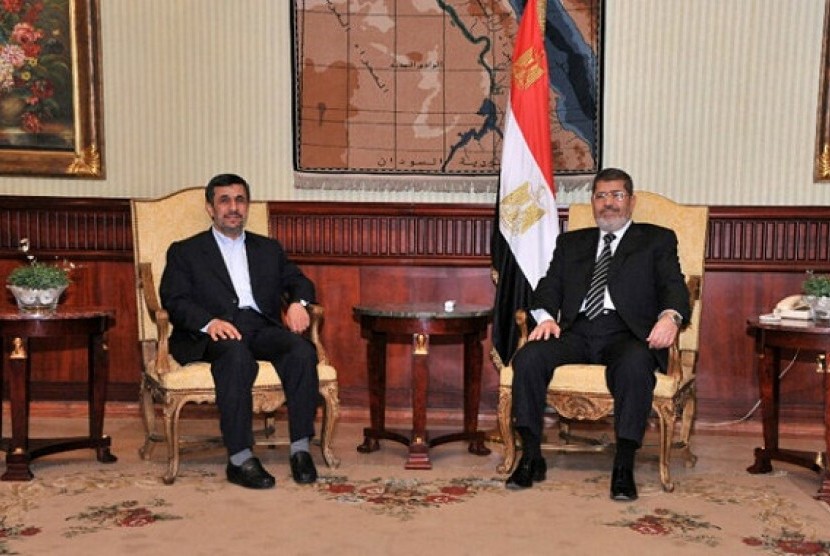REPUBLIKA.CO.ID, CAIRO - President Mahmoud Ahmadinejad arrived in Egypt on Tuesday for the first visit by an Iranian leader since 1979, marking a historic departure from years of frigid ties between the two regional heavyweights.
Egypt's Islamist President Mohammed Mursi gave Ahmadinejad a red-carpet welcome on the tarmac at Cairo airport, shaking the Iranian's hand and exchanging a kiss on each cheek as a military honor guard stood at attention. Mursi visited Tehran last year to attend an international summit in the first visit by an Egyptian leader to Iran in years.
Ahmadinejad's three-day visit, which is centered around an Islamic summit, is the latest sign of improved relations between the countries since the 2011 uprising ousted Egypt's longtime ruler President Hosni Mubarak and brought an Islamist government to power in Cairo. Such a visit would have been unthinkable under Mubarak, who was a close ally of the US and shared Washington's deep suspicions of Tehran.
Shortly after his arrival, Ahmadinejad and Mursi held a 20-minute talk that focused on the civil war in Syria, security officials said on condition of anonymity because they were not authorized to brief the media. Iran is Damascus' closes regional ally, while Egypt is among those that have called on Syrian President Bashar Assad to step down.
In September, Mursi offered a package of incentives to Tehran to end its support for Assad. The proposal included the restoration of full diplomatic ties, which would be a significant prize for Iran given that Egypt is the most populous Arab nation and a regional Sunni powerhouse.
Such diplomatic overtures have raised concerns among Sunni Gulf nations, who are keeping a close eye on the Iranian leader's visit. The Gulf states, who are opposed to Iran's regional policies and wary of the Shiite nation, accuse Iran of supporting Shiite minorities in the Gulf, and harbor concerns about Tehran's disputed nuclear program.
During his visit to Egypt, Ahmadinejad is scheduled to meet with Grand Sheikh Ahmed al-Tayeb, the head of Al-Azhar, the Sunni Muslim world's premier Islamic institution. He is also scheduled to attend the summit of the Organization of Islamic Cooperation in Cairo, which starts Wednesday. Security officials said Ahmadinejad is also going to tour the Pyramids in Giza.
Once close, Egypt and Iran severed their relations after the 1979 Islamic Revolution when Cairo offered exile to Iran's deposed shah. Relations further deteriorated after Egypt's peace treaty with Israel.
Mursi's rise to power out of Egypt's own revolution complicates his ability to pursue better ties with Iran when it is seen as suppressing a revolution in Syria. Cairo is home to the offices of the main Syrian opposition council, which has a strong presence of members of the Brotherhood's Syrian chapter.
Mohammed Abbas Nagi, an Egyptian expert on Iran, said Mursi may be trying to restore some level of diplomatic ties with Tehran in order to show that Cairo is pursuing a more independent foreign policy than that of his predecessor and to keep the door open to the Islamic Republic in case the Gulf states' support dwindles.
"Despite the fact that restoring relations is a sovereign decision fully belonging to Egypt, I don't see that Egypt will make a decision separate from the course of its relationship with the US and Israel, for whom Iran is now the main issue," Nagi said.



